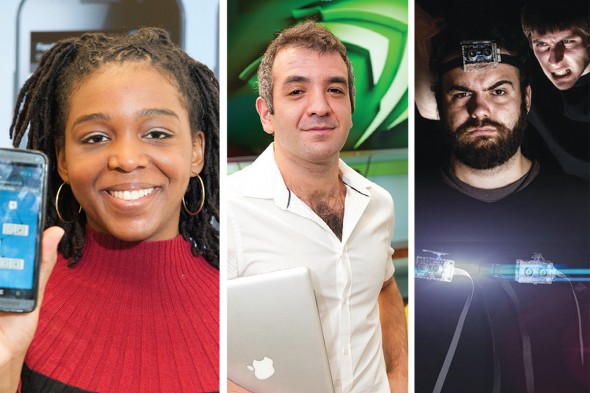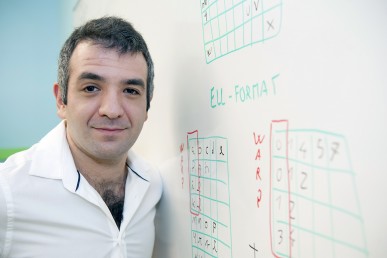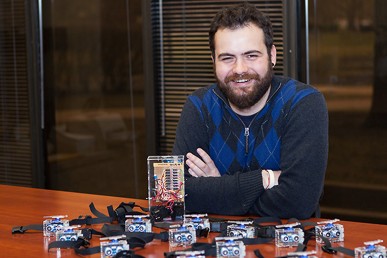Computer science students among ‘Fifty for Future’

Rachel Harsley, Marco Maggioni and Victor Mateevitsi were honored this week by the Illinois Technology Foundation.
Imagine a world where a firefighter could enter a smoke-filled house and find the doors and windows.
Picture an app that teaches astronomy to third-graders.
Look forward to an algorithmic tool that solves all kinds of complex everyday problems 10 times faster.
All these scenarios are possible, thanks to technology created by three UIC graduate students in computer science honored as “Fifty for the Future” this week by the Illinois Technology Foundation.
Victor Mateevitsi, Rachel Harsley and Marco Maggioni are among 50 winners of the award, which recognizes students who use technology in innovative ways. They were honored Tuesday at a reception at the Chicago Cultural Center.
Trailblazer for women, minorities

“I want to see more females and minorities entering into this field,” says Rachel Harsley. Photo: Roberta Dupuis-Devlin/UIC Photo Services
Harsley vividly remembers when her parents brought home the family’s first computer — she was 5 years old.
“I was so intrigued, I was like, ‘How does it know when I’m clicking?’” she said.
Her interest in computers continued during her undergraduate studies at Vanderbilt University. Her teachers pushed her to pursue computer science, even as she wondered whether it was right for her.
“I was hesitant — there were no other black females in the computer science course,” she said. “I didn’t know if I would fit in. But I realized I love programming — it’s like putting together a puzzle.”
Harsley blends her passions for technology and education in her research.
She’s helped create an iPad app that teaches third-graders about the solar system through UIC’s Learning Technologies Group, led by computer science professor Tom Moher.
More recently, she’s developed an intelligent tutoring system that helps college-level students learn about computer science from their smartphones or tablets through her work in UIC’s Natural Language Processing Laboratory, led by Barbara Di Eugenio, associate professor of computer science.
Harsley hopes her work brings attention to the opportunities for women and minority students in computer science and engineering. She is mentor for undergraduate students through the National Society of Black Engineers and the Minority Engineering Recruitment and Retention Program.
“I want to see more females and minorities entering into this field,” she said. “Some girls are willing to try it but are isolated.
“I want to be a role model and a trailblazer. I can do that by doing my research and encouraging people to enter the field.”
Harsley has worked on mobility projects such as Android app and tablet development through internships at Intel, GE and AT&T. She’s not sure whether she will work in the business world or enter academia when she finishes her Ph.D.
“I really enjoyed my industry experience and I know that I can be a great influence as a professor,” she said. “I’m still trying to sort it all out.”
When she’s not in her lab, you can often find Harsley practicing her hoop skills.
“I’m always at the Rec Center just shooting around,” she said. “I’m just glad I’m out of the lab.”
She also enjoys creating music and mixing up songs on her keyboard.
“It’s sort of random — beats, techno, sometimes jazzy,” she said. “I’m not a formal musician. I hear something in my head and play it out.”
Solving complex problems faster

“I’m one of the most traveling Ph.D. students at UIC,” Marco Maggioni says. Photo: Roberta Dupuis-Devlin/UIC Photo Services
Maggioni’s research is versatile — finding ways to solve complex problems quickly.
“It’s a general problem solver,” he said. “You can apply it to basically everything — scheduling the landing of planes at airports, solving problems in finance.”
His work involves developing efficient algorithms on graphic processing units, specialized electronic chips used in graphics that also have more general scientific uses.
“I’m trying to provide a better solution to problems up to 10 times faster,” he said.
Maggioni applies this efficiency tool to problems in computational biology, specifically kinship reconstruction.
“It’s interesting to see which animals are from the same sibling group,” he said. “You can infer things about mating and behavior and it’s a very relevant research question.”
He’s continuing research on zebras and baboons in Kenya after studying there in spring 2012 through “Field Course in Computational Population Biology,” a computer science doctoral course led by associate professor Tanya Berger-Wolf.
He’s headed back to Kenya in December to use a new technology that uses unmanned aerial vehicles to fly over animals and collect data on them.
Maggioni joined UIC in 2007 as an exchange student from Politecnico di Milano in Italy. He received joint master’s degrees in computer engineering from his university in Milan and a graduate degree in computer science from UIC in 2009.
He decided to stay at UIC for his Ph.D. studies in computer science and competed a concurrent master’s degree in bioinformatics in 2012.
“I started working on problems in biology and I needed the knowledge to be efficient and good in the field,” he said.
Maggioni travels often for research. This year alone, he’s traveled at least 10 times for conferences around the world, from Spain to California.
“I’m one of the most traveling Ph.D. students at UIC,” he said.
Making sense of surroundings

“I’m researching ways to augment human senses,” Victor Mateevitsi says. Photo: Ronald Fernandez/UIC College of Engineering
At UIC’s Electronic Visualization Laboratory, Mateevitsi developed “SpiderSense,” a special suit that allows users to sense objects around them without sight or sound. The suit began as a class project in a human augmentics led by Jason Leigh, professor of computer science and EVL director.
“If you have a vision or hearing impairment, you can feel people or objects around you,” he said. “It can also be used for simpler things, like just moving around your house and not bumping into things, even if you don’t have any impairments. There are a lot of possibilities.
“I’m researching ways to augment human senses, how we can use technology to do that, and how people perceive the new augmentation.”
Mateevitsi received his bachelor’s in computer science and technology from the University of Peloponnese in Greece, where he created tools for virtual museums.
He’s used his virtual reality background in his internships at Pixar Animation Studios and DreamWorks, developing software tools for artists and animators to make movies.
When he finishes his doctorate program, Mateevitsi isn’t sure whether he will join a research lab or a university.
“I like academics a lot because of the research part and the teaching,” he said.
Mateevitsi is an avid sports player who enjoys snowboarding, sailing and ice hockey — he even competed with the Greek National Ice Hockey Team.
He also likes tinkering with the latest technology.
“If there’s a gadget I want, I usually try to buy it so I can play around with it — it helps me keep up with what’s going on around me,” he said.
